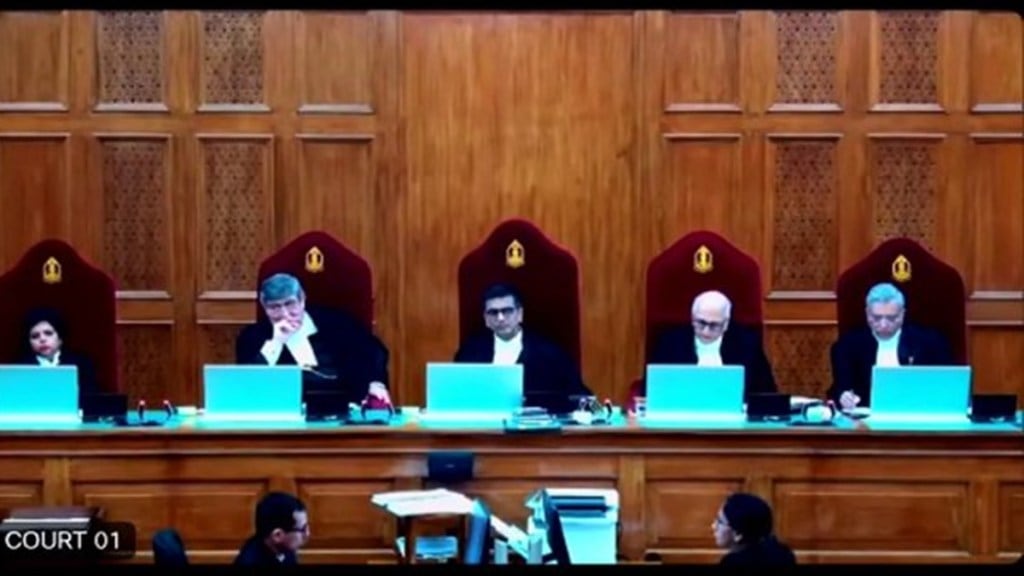Chief Justice of India (CJI) DY Chandrachud on Tuesday issued a slew of directives to the governments at the Centre, states and UTs and the police forces in the country in what is being seen as the court’s attempt to end discrimination and inequality towards same-sex couples in the absence of a right to marry. In its verdict on a batch of petitions, the Supreme Court refused to legalise same-sex marriage in India.
During the hearing, CJI Chandrachud listed several directives and left the decision on the issue to the Parliament. He stated, “The Supreme Court cannot strike down the provisions of the Special Marriage Act (SMA) or interpret the words differently.” The matter was heard by a five-judge Constitution bench led by CJI Chandrachud, and comprising Justices Sanjay Kishan Kaul, S Ravindra Bhat, Hima Kohli, and PS Narasimha.
Also Read: Supreme Court refuses to recognise same-sex marriage in 3-2 verdict
In his opinion, CJI Chandrachud observed that queerness is not limited to urban or elite concepts and that the right to choose a life partner is fundamental, rooted in Article 21 of the Constitution. Justice Kaul also supported CJI Chandrachud’s stance, advocating for civil unions for non-heterosexual couples as a step toward achieving marriage equality.
The CJI acknowledged the Centre’s commitment to forming a committee to address the rights and entitlements of persons in queer unions. He said, ‘We record the statement of the Solicitor General that the Union Government will constitute a committee to determine the rights and entitlements of individuals in queer unions. The committee shall consider various aspects, including recognizing queer couples as a family on ration cards, enabling them to nominate for a joint bank account, and securing rights related to pensions and gratuity, among others.”
Also Read:Same-sex marriage verdict: History and timeline of case ahead of Supreme Court decision today
CJI’s Directions to Centre and State Governments:
- Non-Discrimination: Ensure that there is no discrimination when it comes to the supply of goods and services to individuals from the queer community. Promote public awareness to prevent harassment based on gender identity or sexual orientation.
- Hotline and Safe Houses: Establish a dedicated hotline for the queer community to report incidents and create “Garima Grih” safe houses for queer couples who may face violence or discrimination.
- Age-Appropriate Medical Procedures: Prohibit sex change operations for individuals who are not of an age to fully comprehend the effects of such procedures. Eliminate the requirement for hormonal therapy as a precondition to be recognized as a queer person.
- Marriage Equality: Recognize the right of transgender persons in heterosexual relationships to marry under the existing legal framework, including personal laws.
- Adoption Rights: Allowing and giving unmarried couples, including queer couples, the opportunity to jointly adopt children.
Directions to Police:
- Anti-Harassment Measures: Law enforcement agencies must refrain from harassing queer couples by calling them to the police station or visiting their homes solely for questioning about their gender identity or sexual orientation.
- Freedom of Choice: Do not force queer individuals to return to their native families if they choose not to do so, respecting their autonomy.
- Protection from Family Restrictions: When queer individuals file police complaints alleging that their family is restricting their freedom of movement, police must verify the legitimacy of the complaint and ensure that the individual’s freedom is safeguarded.
- Protection from Violence: When a police complaint is filed, expressing concerns about violence from the family due to the complainant’s queerness or queer relationship, the police should verify the authenticity of the complaint and provide appropriate protection.
- Pre-FIR Inquiry: Before registering a First Information Report (FIR) against a queer couple in connection to their relationship, the police must conduct a preliminary inquiry following established legal guidelines, such as the Lalita Kumari vs. Government of UP, to ascertain that the complaint discloses a cognizable offense.

